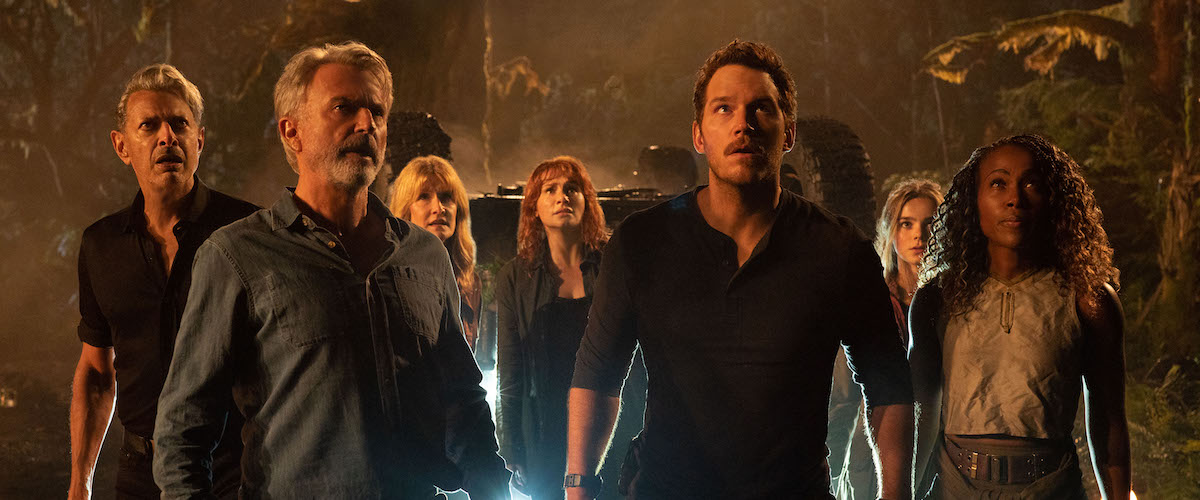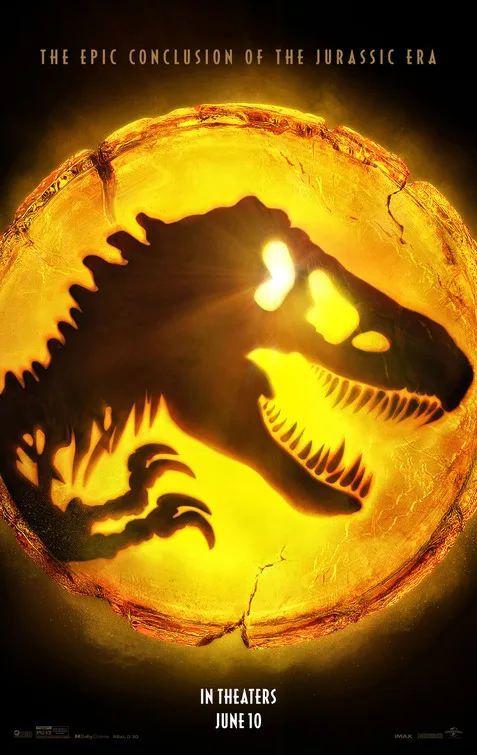Twenty-nine years ago, when “Jurassic Park” was released, computer-generated and digitally composited effects were still relatively new, but director Steven Spielberg’s team raised them to a new level of credibility by deploying them sparingly, often in nighttime and rainy scenes, and mixing them with old-fashioned practical FX work (mainly puppets and large-scale models). The result conjured primal wonder and terror in the minds of viewers. The T-Rex attack in particular was so brilliantly constructed that it put this writer sideways in his seat, one arm raised in front of his face as if to defend against a dinosaur attack. When there was a break in the mayhem, Spielberg cut to a very quiet scene, letting everyone hear how many people in the audience had been screaming in fright, which of course led to raucous laughter and a release of tension (a showman’s trick). A small girl sitting near this writer regarded his still-terror-contorted body and asked, “Mister, are you all right?”
There’s nothing in “Jurassic World: Dominion” that comes close to that first “Jurassic Park” T-Rex attack, or any other scene in it. Or for that matter, any of the scenes in the Spielberg-directed sequel “The Lost World,” which made the best of an inevitable cash-grab scenario by treating the film as an excuse to stage a series of dazzling large-scale action sequences, and giving Jeff Goldblum’s chaos theorist Dr. Ian Malcolm the action hero job. Goldblum, who reprises his role in “Dominion” alongside fellow original cast members Sam Neill and Laura Dern, turned his “Lost World” performance into a wry-yet-cranky meta-commentary on corporate capitalism.
For that matter, there’s nothing in this new film as good as the best parts of “Jurassic Park III,” “Jurassic World,” and “Jurassic World: Fallen Kingdom.” The latter had the most surprising pivots since the original, conjuring Spielbergian magic (think of that shot of the brachiosaur left behind on the dock) and mixing gothic horror and haunted house-movie elements into its second half. “Jurassic Park” creator Michael Crichton’s original inspiration, Mary Shelley’s Frankenstein, was referenced through the character of Maisie Lockwood (Isabella Sermon), a clone created by John Hammond’s business partner to replace the daughter that he lost.
Maisie is one of many major characters featured in “Dominion,” and her tragic predicament has disturbing new details added to it. But returning franchise director/co-writer Colin Trevorrow (writer/director of “Jurassic World”) and his collaborators are unable to focus on their deeper implications long enough to develop Maisie with the sophistication required for a great or even good science fiction/horror film.
The mishandling of Maisie is but one bit of scrap in this dumpster of a sequel. The film opens with Claire Dearing (Bryce Dallas Howard), onetime park operations manager of Jurassic World turned head of the activist Dinosaur Protection Group, breaking into a ranch where baby plant-eaters are being kept and impulsively deciding to rescue one of them. Then she goes to a cabin in the snowy Sierra Nevada mountains, where Maisie is living with the park’s former raptor-whisperer Owen Grady (Chris Pratt). The three form a makeshift nuclear family focused on protecting Maisie against parties who want to exploit her for genetic and financial gain. The semi-domesticated raptor Blue lives with them as well, and has asexually produced a child (mirroring Maisie’s relationship to her mother’s genetic material—though so haphazardly that it’s as if the filmmakers barely even thought of the two creatures as being thematically linked).
There’s also a corporate spy plot (as in most of the other films) involving a thoughtless and/or sinister corporation that talks of magic-and-wonder but is mainly interested in exploiting the dinos and the technology that created them. From “The Lost World” onward, the successors to park founder John Hammond (Richard Attenborough)—a nice old man who meant well but failed to think through the implications of his actions—have been actively treacherous Bad Guy types. The heavy in this one is Dr. Lewis Dodgson, a character from the original film who’s been recast and promoted to CEO of BioSyn (‘bio sin,’ get it?). Dodgson hired another recurring “Jurassic” character, B.D. Wong’s Dr. Wu (arguably the true villain of most of these films, though in an oblivious, John Hammond sort of way) to breed prehistoric locusts that are genetically coded to devour every food crop, save for engineered plants sold exclusively by the company.
Dodgson is the mastermind behind the kidnapping of Maisie and Blue’s child. Actor Campbell Scott uses inventive body language and unpredictable phrasings and pauses to invest the under-written Dodgson with a distinct personality. He turns him into a sendup of two generations of Baby Boomer and Generation X tech-bro capitalist gurus. Dodgson is a man who carries himself like a peace-loving hippie but is really a voracious yuppie who keeps black marketeers and hired killers on retainer. The warm-voiced but dead-eyed way that Dodgson conveys “caring” is especially chilling—like a zombie Steve Jobs. It’s the film’s second most imaginative performance after that of Goldblum, who never moves or speaks quite as you expect him to, and blurts out things that sound improvised. (Chastising colleagues who are moving too slowly for his taste, he snaps, “Why are you skulking?”)
All narrative roads converge at BioSyn headquarters, where Neill and Dern’s Alan Grant and Ellie Sattler have gone to ask Ian Malcolm’s help in obtaining top-secret information that can end the prehistoric locust plague, and where Maisie and Blue’s baby have been brought so that their genetic secrets can be mined as well. Two new characters—Han Solo-ish mercenary pilot Kayla Watts (DeWanda Wise) who says she doesn’t want to get involved in the heroes’ problems and then does, and Dodgson’s disillusioned acolyte Ramsay Cole (Mamoudou Athie)—join the intrigue, and presumably are being introduced as new-generation figureheads who can take over the franchise. Even if the entire film had focused on BioSyn headquarters, the film still might have seemed overstuffed and under-imagined. But Trevorrow turns the movie into a global travelogue, every sequence feeling narratively cut-off from the others in the manner of a substandard spy flick. (There’s even a rooftop chase modeled on one in “The Bourne Supremacy,” but with a raptor.)
A long sequence in Malta, where Claire and Owen have gone to rescue Maisie from kidnappers, encapsulates the film’s failures. There are a lot of promising notions in it, including a dinosaur-focused black market (like something out of a “Star Wars” or Indiana Jones film) where criminals go to buy, sell, and eat forbidden and endangered species. But it’s undone by a lazy undercurrent of comic-book Orientalism and a seeming inability to even see, much less capitalize on, potentially rich material. Michael Giacchino’s score pours on sinister Arabic-African “exotic” cliches, as if setting up an R-rated prison thriller in which Owen does a “Midnight Express” stint in a Turkish prison for hashish possession.
An action scene that throws Owen and the lead kidnapper into a fighting pit where onlookers wager on dinosaur fights is as indifferently composed and poorly edited as nearly every other action scene in the film—and it becomes depressing once you think about what Spielberg, or his favorite second-unit director Joe Johnston (“Jurassic Park III”), might have done with it. It could’ve been a tiny masterpiece of action, slapstick, and social commentary, with the pit audience initially reacting with outrage when their regularly scheduled dino-fights are disrupted, then gleefully shifting gears by betting on the two humans who are going at each other, making fresh odds and handing off fistfuls of cash while baying for blood. Trevorrow looks at this setup and sees nothing but a hero fighting a henchman in a pit.
There’s no scene in the film that’s entirely worthless. There’s no question that at this point, the “Jurassic” factory knows how to design and animate prehistoric creatures and integrate them with live-action scenes of actors running, screaming, shooting, setting fires, and the like. And yet the totality feels indifferently assembled, and the stalkings and chases and dino-battles are for the most part bereft of the life-and-death tension that every other franchise entry has managed to summon. And the plotting is abysmal, relying too heavily on coincidence and flukes of timing, retro-engineering personal connections between new and pre-existing characters, and handing the heroes major victories as casually as a hotel desk clerk giving a guest a room key, instead of letting them earn them through ingenuity.
Trevorrow even manages to recycle, not once but three times, one of the only clever gags in his “Jurassic World”—a comment on the 40-year budgetary and spectacle escalation of the summer blockbuster, in which a great white shark, the creature at the center of Spielberg’s groundbreaking 1975 film “Jaws,” gets eaten by a mosasaurus the size of a skyscraper. Every time Trevorrow does something like this, it feels like an even-more-desperate attempt to remind us of how much fun we might’ve had during “Jurassic World,” which wasn’t that great of a film to start with, and that was dining out on reheated cultural leftovers even during its best moments.
There are also scenes where characters (mainly but not always Malcolm) tie the capitalist rapaciousness of BioSyn to the film you’re sitting there watching. But these don’t have the wit and playfulness that powered similar material in “The Lost World.” They just seem curdled with self-loathing and awareness of how hollow the whole production is. At one point Malcolm chastises himself for taking the company’s money to work as their in-house philosopher/guru even though he knows they’re cynical corporate exploiters, and there’s a self-lacerating edge to Goldblum’s voice that makes it seem as if it’s the actor rather than the character who’s confessing to low personal standards. And there are times where Sam Neill, like Goldblum, seems embarrassed to be onscreen, or at least confused as to what he’s doing in the story—although to be fair, the script never convincingly justifies why Allan, a reluctant action hero in his other two “Jurassic” appearances, would leave the dinosaur dig site where Ellie finds him, other than that he’s from the earlier movies and needed to be here for nostalgia-marketing reasons.
Worst of all, the series again fails to properly explore its most tantalizing question: how would our world change if dinosaurs were added to it? The opening section packs any halfway intriguing or funny thing that “Dominion” might have to say about this topic into a TV news montage—showing, for instance, a little girl being chased on a beach by baby dinos (an homage to “The Lost World”), a couple releasing doves at their wedding only to have one of them get snatched out of the air by a pterodactyl, and pteranodons nesting in the World Trade Center (possibly a reference to Larry Cohen’s “Q: The Winged Serpent,” in which an ancient Aztec god nests in the Chrysler Building). Ninety minutes of footage like this, minus any characters or plot at all, probably would’ve resulted in an artistically better use of a couple hundred million dollars than “Jurassic World: Dominion,” which will doubtless be a smash on the order of all the other entries in the franchise, even though it doesn’t do much more than the bare minimum you’d expect for one of these films, and not all that well.
Now playing in theaters.




















